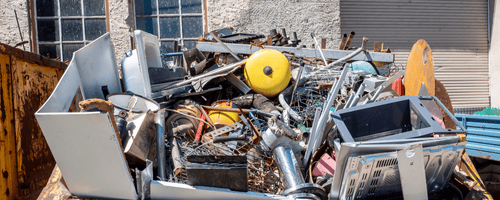Clothing Disposal Services
Convenient, Eco-Friendly Solutions
Scrap metal disposal is essential for keeping your property clean, organized, and environmentally friendly. Metal waste, whether from old appliances, construction materials, or household items, can pile up and take valuable space if not properly handled. If you’re based in Rochester Hills, Michigan, and need professional scrap metal disposal services, our team is here to help. We manage every step, from pickup to responsible recycling, ensuring a safe and hassle-free experience.
This article discusses the benefits of professional scrap metal disposal, the types of metal we handle, and how to schedule a collection with us.
Get a Free Instant Quote!

Over time, wardrobes can overflow with clothes that no longer fit, are out of style, or are simply worn out. While decluttering your closet can feel satisfying, knowing how to dispose of clothing responsibly is just as important. Instead of tossing unwanted garments into the trash, explore eco-friendly and impactful options for giving them a second life.
Why Proper Clothing Disposal Matters
Clothing disposal isn’t just about cleaning up your space—it’s about reducing the environmental impact of textile waste. Here’s why responsible disposal is crucial:
- Environmental Impact: The fashion industry is a significant contributor to global pollution, with synthetic fabrics taking decades to decompose.
- Landfill Overflow: Over 85% of discarded textiles end up in landfills each year.
- Social Contribution: Many discarded clothes can be reused or repurposed to benefit those in need.
Steps for Responsible Clothing Disposal
1. Assess Your Wardrobe
Start by sorting your clothing into three categories:
- Wearable: Items in good condition that can be donated or resold.
- Repurposable: Worn or damaged items that can be turned into cleaning rags, quilts, or DIY projects.
- Unusable: Clothes that are beyond repair and need to be recycled.
2. Donate Usable Clothes
Charities, shelters, and nonprofit organizations are always in need of gently used clothing. Some great options include:
- Local donation centers (e.g., Goodwill, Salvation Army).
- Homeless or women’s shelters.
- Churches or community clothing drives.
Pro Tip: Always wash and neatly fold clothing before donating to make it easier for recipients to use.
3. Sell or Swap
- Online Platforms: Use apps like Poshmark, ThredUp, or Facebook Marketplace to sell gently used, trendy clothing.
- Local Consignment Shops: These shops often accept high-quality items and give you a percentage of the sale.
- Clothing Swaps: Organize or participate in community events where people exchange clothes they no longer want.
4. Recycle Textiles
Recycling centers can transform old fabrics into new materials like insulation, carpet padding, or industrial rags. Look for:
- Textile recycling bins in your area.
- Brands offering recycling programs (e.g., H&M, Patagonia).
- Organizations like TerraCycle or Cotton’s Blue Jeans Go Green.
5. Repurpose for DIY Projects
Get creative by turning old clothing into:
- Cleaning rags.
- Quilts or throw blankets.
- Tote bags, scrunchies, or other upcycled items.
Benefits of Professional Junk Removal for Clothing Disposal
For large-scale cleanouts or estates with overwhelming amounts of clothing, professional junk removal services can save time and effort. These services often work with recycling facilities or donation centers to ensure responsible disposal.
Advantages of Hiring Professionals:
- Convenience: No need to sort, bag, or transport items.
- Eco-Friendly: Professionals prioritize recycling and donating over landfill disposal.
- Bulk Cleanouts: Ideal for decluttering entire homes or large wardrobes.
FAQs About Clothing Disposal
Q: Can I donate damaged or stained clothing?
A: Slightly damaged clothing is often accepted by donation centers, but stained or heavily worn items are better suited for recycling programs.
Q: What’s the best way to recycle clothing?
A: Many recycling facilities accept textiles, and some retailers offer in-store drop-off bins for old clothes. Check local options for specific guidelines.
Q: How do I know if an item is worth donating?
A: If the clothing is clean, wearable, and free of significant damage, it’s a good candidate for donation.